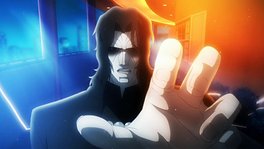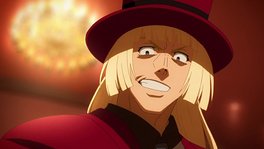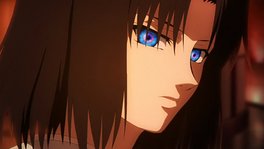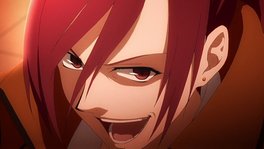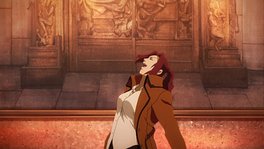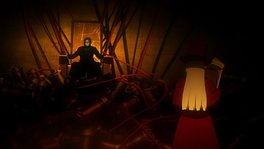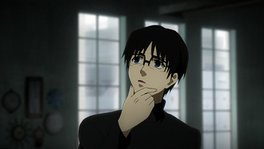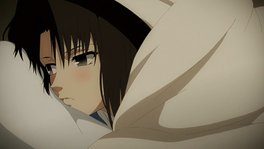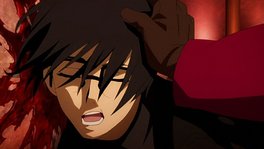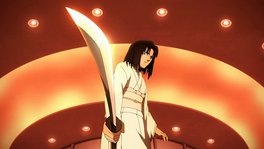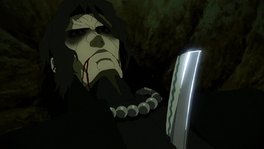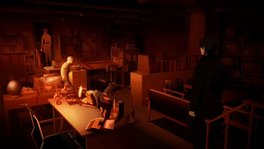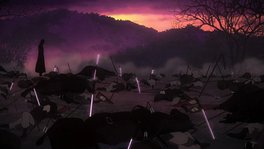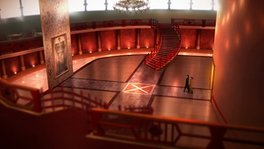This is the movie that Kara no Kyoukai has been building up to. This is the movie that propels the series from brilliant to astounding. This is one of the best anime movies ever created. It starts with a stark black and white divided screen, the name of the film emblazoned across it, and is followed by a chaotic medley of scenes before settling in with, what seems at first blush, a more traditional narrative. However nothing about Paradox Spiral (Paradox Paradigm the officially translated title) is traditional as it twists different threads together in a story that covers time, death, family, gender and the perception of self in a way that is enchantingly cohesive and utterly enthralling.
Set chronologically after the first film, Overlooking View, it is roughly divided into three interwoven stories. The first has Shiki meet up with Tomoe, a teenager who believes he has murdered his parents despite mounting evidence to the contrary. The second focuses on Mikiya and Touko as they investigate an apartment building that Touko apparently had a hand in constructing. The third and final arc binds the previous two together with a face-off against two powerful sorcerers that play fast and loose with the sanctity of human life and the governing laws of the universe. Surpassing even the previous film's fantasy quotient, Paradox Spiral is the most involved and unfettered indulgence in the fundamentals of the Kara no Kyoukai universe yet and manages to weave them flawlessly into a greater exploration of some less travelled topics.
There is no one defining strength of Paradox Spiral, every element is given equal, and that is to say superlative, detail and weight. Aesthetics dazzle, animation wows, the story is unyielding, the implications layered - protagonists and antagonists alike are beyond amazing. The subtle portents dropped in earlier incarnations as to the overseer of the current tribulations seem entirely understated when Araya Souren is introduced. Loaded with gravitas by the sublime Jouji Nakata, the character's very presence is a dark and ominous cloud, juxtaposed by the savage and brutally unhinged Cornelius Alba who is a brilliant but just as malicious foil to Souren's measured and malevolent approach. Each is a magnificent antagonist in their own right but together they have fearsome presence.
Protagonists are free to explode with character: Shiki and Mikiya's relationship is explored in careful and understated ways, while Touko is finally gifted with some backstory to better temper her enigmatic methods. Newcomer Tomoe at first seems like the typical teenage thug: easy to bruise and difficult to contain but even he is given flesh and history in a fittingly economical way; his story may be at the core of the film but it is rarely given prominence above the more intriguing universe at large. Although large parts of the film are segmented in a way that isolates character groups, the dynamism between them that shines through in the third act is quite spectacular - the banter between Touko and Mikiya is forever entertaining but even Mikiya and Tomoe's fleeting connection has a potent discordance that only stellar writing could achieve.
Not content with an overwhelming class of characters, Spiral Paradox is aesthetically coruscating by exploiting animation's strengths over live action. With no time in the close to two hour feature for meandering scene setting, what were once static paintings of breathless beauty are replaced with kinetic and fluid action that is ruthlessly swift and completely impossible for any other medium. The view spins and barrels along with the fights in ways cameras could never hope to achieve; choreographed with an eye for the impressive Shiki proves why it's not just her eyes which make her deadly. While not as iconic as they deserve to be, they are fight scenes that will stand as some of the most accomplished animation work possible without shifting wholly to computer graphics.
More so than the those before it, this film is rife with symbolism, the most obvious being the Taoist ying-yang or the Taijitu in the film's parlance; it permeates the fibre of the film defining its structure, guiding its antagonists and adorning incidental but important props throughout. Demarcated by the monochrome eyecatches, the association with the symbol is clear especially with the visual and narrative blending that occurs in the third act. It's a fantastic device that once spotted promotes repeated viewings but crucially leads to the most prominent theme of the movie: gender. Starting by first focusing on Shiki and then Mikiya the story at least follows the pattern, more so when you realise the secondary characters - Tomoe and Touko - adhere even closer to the idea of the ying-yang. More than that however is the constant questioning of the concept of gender with Shiki's masculine manner of speech or Azaka questioning whether her brother Mikiya would still like Shiki if she were male; there are also the more blatant scenes with dolls who share either both or neither defining characteristics of each sex.
Far from confined themes though, they all bleed into and reinforce one another springing up further philosophical questions that have increasingly murky but far reaching implications: the idea of a home - spelled out by Tomoe to a reticent Shiki; complimentary contrasts - stated by Souren referring to Fujino and Kirie being mirrors of Shiki; and the most base and familiar of questions: what defines a human? Brains in jars, puppets and clones, centuries old sorcerers - this is the question the film asks without overtly aiming to, sneaking it in then concentrating on the more relevant and less nebulous concepts. The rare slower paced scenes are reserved for some of the denser jargon of the series including ominous mention of The Origin, a kind of sorcerer's holy grail promising omnipotent knowledge of all things past, present and future as well as a mysterious "counter force", described as the universe's way of disallowing too much power or control. Were any this exposed in the opening films, ponderous and contextless, the series would likely be a wholly different beast. For audiences new to the Kara no Kyoukai franchise who have waited expectantly, the technobabble is the best kind of pay off. Like being launched off a precipice after a slow climb up, the free-fall into the minutiae of the world is liberating: the series has finally manoeuvred itself into a position capable of pulling it off.
Kara no Kyoukai: Paradox Spiral is one of the best pieces of media to come out in a very long time. It combines narrative depth with visual flair and walks a knife edge between confidence and pretentiousness to create something thoroughly resplendent. It does not transcend nor forsake its genre, conscious that its audience is most demanding, it simply ignores barriers other films might be overtly aware of. The previous movies were proving grounds for everything in this film: animation is scintillating and frequently peerless, the audio is perfect and refined to scalpel precision, direction is accomplished - the production is universally flawless. There is very little which even approaches the breadth and assuredness of this film and it represents the pinnacle of so many different talents; its creativity is overwhelming and to have seen this is to have witnessed an unbridled masterpiece.
